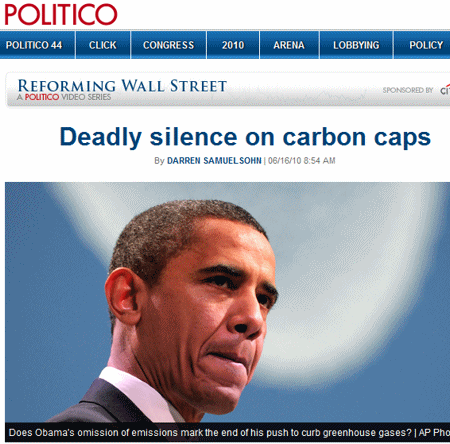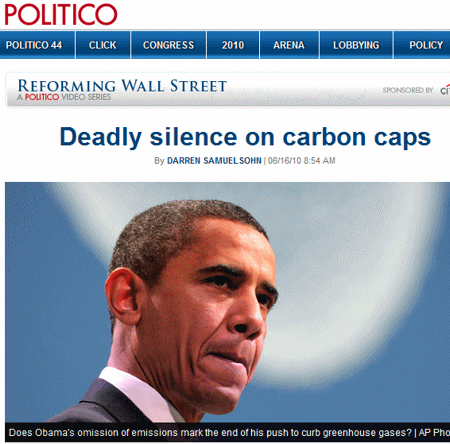 If you ever want to know what the inside-the-beltway conventional wisdom is, look for Politico’s screaming headline. “Deadly silence on carbon caps,” is today’s tea-leaf reading article, which asserts that Obama “may have put the dagger into his long-sought plans for a cap on greenhouse-gas emissions by opening the door for alternatives.”
If you ever want to know what the inside-the-beltway conventional wisdom is, look for Politico’s screaming headline. “Deadly silence on carbon caps,” is today’s tea-leaf reading article, which asserts that Obama “may have put the dagger into his long-sought plans for a cap on greenhouse-gas emissions by opening the door for alternatives.”
Speeches, while important, aren’t daggers — and, in any case, conventional wisdom in the Politico and elsewhere around D.C. has been that a GHG cap has been dead for months.
But Obama could easily have skipped the pivot to comprehensive energy and climate legislation, and, as I’ve noted, “The talking points are better than the speech.”
I would also add that cap-and-trade is a desperately bad centerpiece for messaging — since it focuses entirely on process and not outcomes/benefits that matter to the general public. Obama focused on the latter in his speech. He pointed out that he has “laid out a set of principles that would move our country towards energy independence” and that the House “acted on these principles by passing a strong and comprehensive energy and climate bill – a bill that finally makes clean energy the profitable kind of energy for America’s businesses.”
He has demanded a bill that transitions us away from fossil fuels as the House bill does. True, Obama didn’t use inside-the-beltway jargon — so the inside-the-beltway crowd panned him. I myself was not terribly thrilled with the part on climate, and wish he had just read the White House talking point:
The House of Representatives has passed a comprehensive energy and climate bill, and there is currently a plan in the Senate – developed with ideas from Democrats and Republicans – that would achieve similar goals. And the President is committed to working with anyone from either party to get this done, because the cost of inaction to our economy, our national security, and our environment is too great.
That doesn’t mean there aren’t tea leaves to read about Obama’s failed leadership here to date. I just don’t think you’ll find them in this speech, which, given the subject matter (the BP disaster) and the audience (the whole nation), actually devoted a great deal of time to the urgent need to embrace the clean energy transition.
No, the failure in leadership is evident elsewhere — in this Tuesday The Hill story, for instance, “Key Dem says votes lacking to include climate change in energy bill“:
Sen. Byron Dorgan (D-N.D.), a senior member of the Senate Energy and Natural Resources Committee, dismissed any hopes his colleagues might have of including regulations to clamp down on emissions as part of a comprehensive energy bill this summer.
“Now, there are others in Congress who would like to bring a climate change bill and add that [to an energy bill],” Dorgan said Tuesday morning on C-SPAN’s “Washington Journal.”
“You know, it would take 60 votes in the Senate to do that,” he added. “I doubt very much whether those 60 votes exist right now.”
And you can see the leadership failure in this Bloomberg/BusinessWeek story, “Climate Bill Lacks Momentum Even After BP Spill, Democrats Say”
Many Democrats don’t want to vote in this election year on whether to cap the greenhouse-gas emissions linked to climate change, saying they prefer to work in the coming months on legislation directly responding to the spill.
“The climate bill isn’t going to stop the oil leak,” said Senator Dianne Feinstein, a California Democrat. “The first thing you have to do is stop the oil leak.”
… “There’s not a great call for it in the Democratic caucus,” said West Virginia Democratic Senator Jay Rockefeller, who has argued against taking up the bill. Feinstein said last week she believed climate legislation could be passed next year.
These remarks range from unhelpful to inane. Does Feinstein really think next year their will be a better chance of passing climate legislation when there will be half a dozen fewer Democrats in the Senate and the House could conceivably flip to the Republicans? Is that her rationalization?
The president has either not tried to get senior Democrats to stop bad mouthing climate action in public — or he has tried and failed. Either way, that demonstrates an absence of serious leadership on this most important of issues.
The president should have spoken to Dorgan and Feinstein months ago, and said, “We need to do this. We’re going to do this. I need your help. What do you need from me?” Indeed, he should have made a couple dozen such calls after the House passed the bill a year ago.
So, sure, feel free to criticize him for not using a few beltway code-words in his big speech, but actions speak louder than words — and so far one sees very little sign of action.
One final point: Obama should give a primetime speech on climate change soon. His science advisor John Holdren has said he would: “there certainly will be a major speech by the president that puts this all together in a forceful way.”


